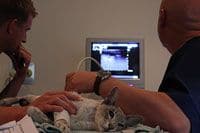Healthy sweeteners aren’t so healthy for your dog
It is common knowledge that animals can become very sick from eating chocolate, but did you know that there are many other everyday foods that are harmful to your furry friends? For instance, gum, avocados, grapes and some nuts can be toxic to animals.
The sweetener Xylitol, is a substance most commonly found in several foodstuffs as well as a number of confectionery items. Unlike sugar, Xylitol doesn’t contain calories or cause insulin release, and is often used for weight loss. It is especially popular with diabetics.
While it has some benefits for humans, it is a very different story for dogs. Xylitol causes a massive release of insulin which is effectively the same as an overdose. The insulin causes glucose to move into the body’s cells and out of the bloodstream which causes hypoglycaemia (critically low blood sugar). This low blood sugar causes seizures (convulsions), coma (unconsciousness) and can cause death. Xylitol has also been reported to cause liver failure.
The amount required to make a dog sick is very small. When Xylitol is present in sugar free gum there is 1-2g per piece, which is enough to cause hypoglycaemia in a 10kg dog. A cup of sweetener would be enough to kill a large dog.
We have seen the effects of Xylitol first hand. Following a trip to the United States, the owner of a Staffordshire bull terrier brought back a pack of American gum. Half a pack later and her dog developed dangerously low blood sugar which persisted for days.
Earlier this year a Great Dane was admitted to our care after eating the sweetener powder (commonly used in baking). Spending three days in the intensive care ward in a critical condition, our team was able to stabilise the pup and he went home to his very relieved family.
Fortunately, at this stage we only see a handful of cases due to Xylitol per year. However, the sweetener is becoming more popular as people seek out low-calorie alternatives for sugar. While there are no reported cases in cats, it is yet to be known if it affects them the same way as dogs.
As pet owners, it is crucial to seek out information about which foods are safe to feed the four-legged members of the family. For instance, you may not have heard about Xylitol before reading this article, but it is much more common than you might think. It is found in certain sugar free gum, toothpaste, and other dental products. It is also used in human medical products (but not always listed as an ingredient) to make them more palatable for patients.
Poisoning as a result of ingesting harmful substances contained in food is a serious problem. It’s hard to resist big puppy dog eyes when you’ve got that last bite of a cookie. It’s important to remember however that animals can’t digest or metabolise some food the way humans do. So, before you give in to that loveable face, make sure you know what food is safe for your pooch.
If you have any questions or think your pet has eaten something potentially harmful, please give us a call on 1300 040 400 or visit our website www.pve.net.au.



